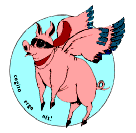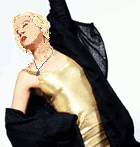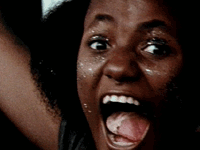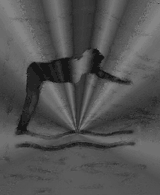| The Journal of Provincial Thought |



| Al Mimsy & the Borogoves play Mome Raths Outgrabe! Neobop septet features rare instruments such as entwhistle, Ood, serpent, bass sarrusophone, alto ophicleide, keyed bugle, standpipes and crackpot, played by graduates of top music conservatories who dress like MBAs, but without the funny hats and sunglasses. Reissue of the revered 1957 masterpiece. Golden Balls 33-678 (2CDs) | ||||||||||||
 |
Lucerne Courgette, singing “Mind the Gap” and other hits from her CD Toujours Espalier. A concert recording of the Eurotrash diva at the top of her game, recorded live in 2003 at the Nurburgring, between races. Mundo Mongo 44 | |||||||||||
| Bulldog Drummin’—featuring Alfonse “Bulldog” Brixton (dms), with Felonius Mink (pno) and Bowfinger Billups (bs). Virtuoso display of free jazz percussion, recorded in 1961 and mercifully lost in the archives till recovered by archaeologists in 2004. A 120-minute tirade for full drum kit, plus exotic percussion instruments, often homemade. Glue Note 112 (2 CDs) | ||||||||||||
| Jacksonian Aeroplane, How Hi at Noon. The jazz-blues-rock-fusion-reggae-hiphop masterwork in unexpurgated form for the first time. Recorded at a small, sleazy dive in the Hellhole District of |
 |
|||||||||||
|
||||||||||||
 |
Shun Rays, Galicticoanthroplexicontinuum. Once a self-issued LP (1967), this amazing visionary music purports to come from other planets, foretell the future and to cure warts and bunions. Shun Rays’ “yorkestra” was a large aggregation of self-taught musicians who followed astrological charts rather than musical notation and often played on instruments fabricated from plumbing fixtures and galvanized tin. Rays went on to lead a conventional suburban dance band, losing all his rabid fans. The mystical significance of Rays’ music escaped many listeners who were otherwise enchanted with its childish imbecility. Rayzolot 3346-87. | |||||||||||
|
Third Streaming! by Grunter Schiller. A tedious academic who played only the bagpipes but hung out with jazz musicians in 1958 invented a harmonic system based not on 12 tones but on male urinary incontinence. Despite reams of esoteric rationalization, no one has been able to understand this process derived from obscure Hindoo dietary practices and reduced to conventional music notation by Schiller and a cadre of near-sighted scribes. This 1971 recording of a vast ensemble of strings and winds sounds like nothing on earth so much as the Bronx Zoo on free day. Hyperbolic 346. Ordure of the Day by Stank Enton. Once believed to be “the music of the future” and the height of “progressive jazz,” Enton’s work (1947-49) here includes his mystical tone poem, “City of Crass,” the extroverted “Rhumbalicious” and the three-part hyper-artsy suite, “Artistry in Stasis,” “Artistry in Whole Notes” and “Artistry in Silence,” along with shorter, more bearable works. It features a studio orchestra considerably larger than the N.Y. Philharmonic, playing steadily at fff volume, so watch your woofers and tweeters! Entonwerk GG4456. Groove’s Bag, by Gnusome Gnutzwort. Classic Carnegie Hall concert of 1956 by the man who made the standard-issue glockenspiel a jazz instrument, first with the Moderne Jass Double Octet and then with Viscount Virulent’s big band. This live perambulation features Percy Dovetonsils’ ultra-reboppish vocals and a long drum solo by quadriplegic percussion master Newt Nonesuch, as well as able backup from trumpet king Ira “Blotto” Glottis and all-purpose sax wizard Elmer S’gloo. Wideawake SCD 33-478. Attack! by Alberto Quaedo and His Afro-Cubana Sextette. Stunning 1959 album by the master of synthesizing traditional Hispano-Suzy and West Coast Cool. As trumpeter/arranger Quaedo said of the fabled session, “We found the groove and kicked its ass!” Best known now as a film-music genius (such big-screen bonanzas as Man with the Platinum Putz, Black Day in Bad Rock and Invasion of the iPod People), Quaedo won a coveted Golden Gonad Award for this session, now restored in digitized glory. Bumpuss CD33245. Blueberry Hell, by “Fatz” Checkers. Classic rhythm ’n jazz singles from the mid-1950s by the |
||||||||||||
|
||||||||||||
|
||||||||||||